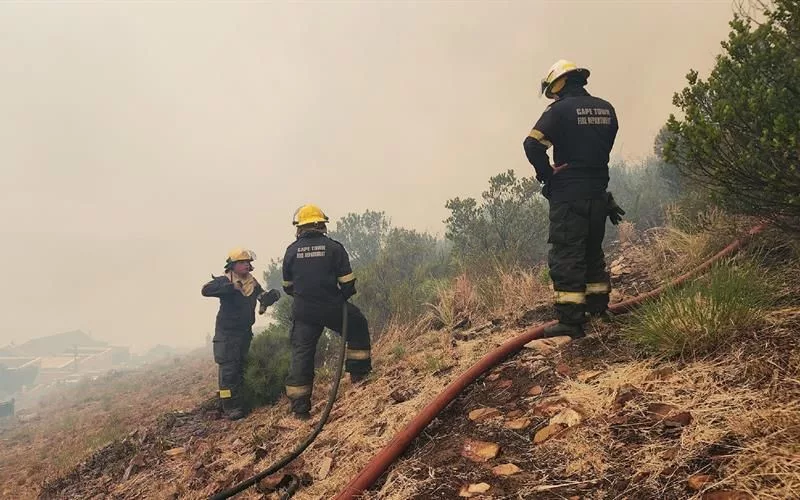Cape Town’s Fire and Rescue Service has responded to over 13,000 incidents in the past quarter, making it one of their busiest periods in four years. Despite a 12% increase in incidents year on year, the city’s firefighting capabilities have remained strong, with plans to strengthen infrastructure and educate the public. While there has been a rise in vegetation fires, the city’s firefighters remain resilient, with ongoing initiatives to ensure safety and security.
What is the state of Cape Town’s Fire and Rescue Service amidst rising incidents?
Over the past quarter, Cape Town’s Fire and Rescue Service has responded to more than 13,000 incidents, marking one of their busiest periods in the past four years. Despite a 12% increase in incidents year on year, their firefighting capabilities have remained steadfast, with plans to strengthen their infrastructure and ongoing initiatives to educate and raise awareness.
Over the past quarter, Cape Town’s Fire and Rescue Service has showcased exceptional fortitude, responding to more than 13,000 incidents. This marks one of their busiest periods in the past four years. Particularly between October and January, reported incidents surged considerably, making up 55% of all vegetation fires. This reflects the service’s indefatigable commitment in challenging times.
Analyzing Patterns and Trends in Incidents Over Time
Detailed data from the last four years indicates evolving trends in the frequency and nature of incidents. An overall increase of 12% in incidents year on year has been observed, covering a range of scenarios including fires, rescues, vehicle accidents, and trauma cases.
An alarming trend has been the rise in vegetation fires, with an upswing of 19% compared to the same period last year. The steadily climbing numbers of vegetation fires over the past three years are a stark reminder of the growing issue that presents a formidable challenge to the city’s fire service.
Firefighting Capabilities Remain Unbroken
Despite the intimidating tally of incidents, the city’s fire-fighting abilities have remained steadfast. Alderman JP Smith, Mayoral Committee Member for Safety and Security, praised their response, stating, “The response to date speaks volumes about the City’s ability to handle adversity. We are not out of the woods yet, but I want to commend everyone involved in what has been one of the busiest periods from a firefighting perspective.”
Contrary to the escalating vegetation fires, there has been a marginal dip in both informal and formal residential fires compared to last year. However, data does reflect a significant uptick in residential fires compared to the period between October 2020 – January 2021.
Alderman Smith also highlighted the seriousness of structural fires, stating, “The increases over the past three years came at a time of increased frequency and stages of load-shedding, but we also face ongoing challenges like illegal electricity connections, human error or negligence, and an increase in incidents where bystanders interfere with firefighters.”
Fire Safety Initiatives And The Role of Community
To meet these challenges head-on, the city has launched fire safety awareness and education programs, with several departments conducting hundreds of interventions each year. The residents of Cape Town are encouraged to play an active part in reducing the chance of fires in their homes and communities.
Strengthening Cape Town’s Firefighting Infrastructure
Cape Town’s solid firefighting infrastructure includes 32 fire stations, the most recent ones being Sir Lowry’s Pass and Kommetjie Road, established in 2021 and 2020 respectively. The city is far from complacent, with plans afoot to begin construction on a 33rd fire station in Langa, symbolizing its commitment to bolstering its firefighting capabilities.
Managing these fire stations are the city’s courageous firefighters, with a minimum of 240 of them on operational duty each day. Additionally, Incident Management Teams are always on standby, prepared to respond promptly to major incidents.
The Resilience of Cape Town’s Firefighters Amid Challenges
Amid adversities and growing challenges, the dedication of Cape Town Fire and Rescue Service to their duty remains unswerving. Their relentless efforts, bolstered by robust infrastructure and ongoing initiatives to educate and raise awareness, form the cornerstone of the city’s commitment to safety and security. The city continues to evolve and adapt, standing ready to face whatever challenges lie ahead.
1. How many incidents has Cape Town’s Fire and Rescue Service responded to in the past quarter?
Cape Town’s Fire and Rescue Service has responded to over 13,000 incidents in the past quarter, making it one of their busiest periods in four years.
2. What is the trend in incidents over the last four years?
Detailed data from the last four years indicates an overall increase of 12% in incidents year on year, covering a range of scenarios including fires, rescues, vehicle accidents, and trauma cases.
3. What is the trend in vegetation fires?
An alarming trend has been the rise in vegetation fires, with an upswing of 19% compared to the same period last year. The steadily climbing numbers of vegetation fires over the past three years are a stark reminder of the growing issue that presents a formidable challenge to the city’s fire service.
4. What initiatives has the city launched to address fire safety?
The city has launched fire safety awareness and education programs, with several departments conducting hundreds of interventions each year. The residents of Cape Town are encouraged to play an active part in reducing the chance of fires in their homes and communities.
5. How many fire stations does Cape Town have?
Cape Town has 32 fire stations, with plans to begin construction on a 33rd fire station in Langa to further bolster its firefighting capabilities.
6. What is the resilience of Cape Town’s firefighters amid challenges?
Amid adversities and growing challenges, the dedication of Cape Town Fire and Rescue Service to their duty remains unswerving. Their relentless efforts, bolstered by robust infrastructure and ongoing initiatives to educate and raise awareness, form the cornerstone of the city’s commitment to safety and security.












